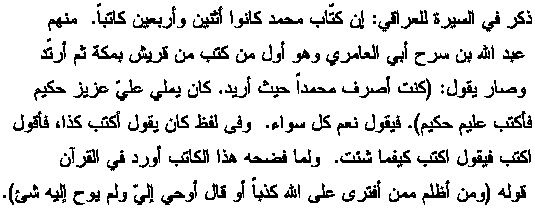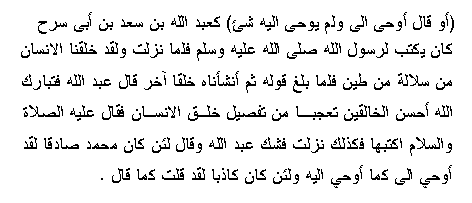The story of Abdullah ibn Sa`d Ibn Abi Sarh is weak because its found in weak sources of Islam. See below, they come from Ibn Ishaq, Ibn Sad and Tafsirs and Al-Sira Iraqi. All these sources are weak, Muslim scholars don't accept them:
Shaykh ibn Taymiyyah said:
Allah has provided evidence (i.e. Isnad) establishing the authenticity or lack thereof of the narrations that are necessary in matters of the religion. It is well known that most of what was reported in aspects of Tafsir (commentaries on the Qur'an) is similar to narrations reporting Maghazi (or Seerah) and battles, promoting Imam Ahmad to state that three matters do not have Isnad: Tafsir, Mala'him (i.e. great battles), and Maghazi. This is because most of their narrations are of the Maraseel (plural for Mursal) type, such as narrations reported by Urwah Ibn az-Zubair, ash-Sha'bi, az-Zuhri, Musa Ibn Uqbah and Ibn Ishaq." (Shaykh Ibn Taymiyyah, Majmu' Al Fataawa, Volume, 13, page 345)
PRESENTATION OF ISLAMIC SOURCES
#1 SIRAT RASUL ALLAH
Quoting from "The Life of Muhammad", A Guillaume's a translation of Ibn Hisham's "Sirat Rasul Allah", from page 550: [words in brackets [ ] are mine]
The apostle had instructed his commanders when they entered Mecca only to fight those who resisted them except a small number who were to be killed even if they were found beneath the curtains of the Ka`ba. Among them was `Abdullah b. Sa`d, brother of the B. `Amir b. Lu'ayy. The reason he ordered him to be killed was that he had been a Muslim and used to write down revelation; then he apostatized and returned to Qurahysh [Mecca] and fled to `Uthman b. `Affan whose foster brother he was. [`Uthman was one of Muhammad's closest friends, and later became the Caliph of Islam]. The latter hid him until he brought him to the apostle after the situation in Mecca was tranquil, and asked that he might be granted immunity. They allege that the apostle remained silent for a long time till finally he said yes, [granting `Abdullah immunity from the execution order]. When `Uthman had left he [Muhammad] said to his companions who were sitting around him, "I kept silent so that one of you might get up and strike off his head!" One of the Ansar [Muhammad's helpers from Medina] said, then why didn't you give me a sign, O apostle of God?" He [Muhammad] answered that a prophet does not kill by pointing.
NOTE: the Sirat Rasul Allah is the earliest and most authentic biography of Muhammad. It was even written before the Hadith were compiled.
#2 KITAB AL-TABAQAT AL-KABIR
[Note: words in [ ] brackets are mine]. I have also added ( ) brackets to associate numbers with the people in the list.
Muhammad ordered the execution of 10 people when he took Mecca. Here is the list of names found in Ibn Sa`d "Tabaqat", Vol 2, page 168.
The apostle of Allah entered through Adhakhir, [into Mecca], and prohibited fighting. He ordered six men and four women to be killed, they were (1) Ikrimah Ibn Abi Jahl, (2) Habbar Ibn al-Aswad, (3) Abd Allah Ibn Sa`d Ibn Abi Sarh, (4) Miqyas Ibn Sababah al-Laythi, (5) al-Huwayrith Ibn Nuqaydh, (6) Abd Abbah Ibn Hilal Ibn Khatal al-Adrami, (7) Hind Bint Utbah, (8) Sarah, the mawlat (enfranchised girl) of Amr Ibn Hashim, (9) Fartana and (10) Qaribah.
Occasionally, the Sirat, and the Tabaqat use a different name for the same person. #3 in the list given above is such a case. The differences in the name is due to the amount of family lineage given for the man's name, and the english translation.
Ibn Sa`d corroborates Ibn Ishaq and says on page 174:
A person of al-Ansar had taken a vow to kill Ibn Abi Sarh [the already mentioned Abdallah] if he saw him. `Uthman whose foster brother he (Ibn Abi Sarh) was, came and interceded for him with the prophet. The Ansari was waiting for the signal of the prophet to kill him. `Uthman interceded and he [Muhammad] let him go. The the apostle of Allah said to the Ansari, "Why did you not fulfil your vow?" He said, "O apostle of Allah! I had my hand on the hilt of the sword waiting for your signal to kill him." The prophet said signalling would have been a breach of faith. "It does not behave the prophet to make signal."
NOTE ON THE TABAQAT:
The Tabaqat was translated into English by Moinul Haq, a Pakistani. His work was published by the Pakistan Historical Society. It is published in English in two volumes. The title means "Book of the Major Classes". It is basically a biography of Muhammad.
#3 From Al-Sira by al-'Iraqi
The scribes of Muhammad were 42 in number. `Abdallah Ibn Sarh al-`Amiri was one of them, and he was the first Quraishite among those who wrote in Mecca before he turned away from Islam. He started saying, "I used to direct Muhammad wherever I willed. He would dictate to me 'Most High, All-Wise', and I would write down 'All-Wise' only. Then he would say, 'Yes it is all the same'. On a certain occasion he said, 'Write such and such', but I wrote 'Write' only, and he said, 'Write whatever you like.'" So when this scribe exposed Muhammad, he wrote in the Qur'an, "And who does greater evil than he who forges against God a lie, or says, 'To me it has been revealed', when naught has been revealed to him." So on the day Muhammad conquered Mecca, he commanded his scribe to be killed. But the scribe fled to `Uthman Ibn `Affan, because `Uthman was his foster brother (his mother suckled `Uthman). `Uthman, therefore, kept him away from Muhammad. After the people calmed down, `Uthman brought the scribe to Muhammad and sought protection for him. Muhammad kept silent for a long time, after which he said yes. When `Uthman had left, Muhammad said "I only kept silent so that you (the people) should kill him."

The above quotation in both English and Arabic is from the respective edition of Is the Qur'an Infallible? by `Abdallah `Abd al-Fadi, Order Number VB 4009 E, Light of Life, P.O. Box 13, A-9503 Villach, Austria. The book is availabe in English, and the original Arabic edition.
Al-Iraqi refers to Sura 6:93 above. From Dawud's translation Sura 6:93 reads:
Who is more wicked than the man who invents a falsehood about God, or says: "This was revealed to me", when nothing was revealed to him? Or the man who says, "I can reveal the like of what God has revealed"?
#4 Al-Baidawi commenting on the Qur'an, Sura al-An`am 6:93

"'To me it has been revealed', when naught has been revealed to him" refers to `Abdallah Ibn Sa`d Ibn Abi Sarh, who used to write for God's messenger. The verse (23:12) that says, "We created man of an extraction of clay" was revealed, and when Muhammad reached the part that says, "... thereafter We produced him as another creature (23:14), `Abdallah said, "So blessed be God the fairest of creators!" in amazement at the details of man's creation. The prophet said, "Write it down; for thus it has been revealed." `Abdallah doubted and said, "If Muhammad is truthful then I receive the revelation as much as he does, and if he is a liar, what I said is a good as what he said."
Quoted from the famous Tafsir Anwar al-Tanzil wa Asrar al-Ta'wil by `Abdallah Ibn `Umar al-Baidawi.
No comments:
Post a Comment
Note: Only a member of this blog may post a comment.